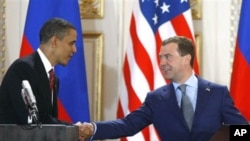Delegations from the United States, China, Russia, the United Kingdom, and France (known as the P-5 countries) recently gathered in Paris for a second Conference on Confidence Building Measures toward Nuclear Disarmament and Non-Proliferation. The June 29th to July 1st Conference served to build on the countries' commitments made at the first Conference held in 2009 and to reaffirm their obligations under the Nuclear Non-Proliferation Treaty of 1968.
Under Secretary for Arms Control and International Security Ellen Tauscher led the U.S. delegation at the Conference.
"The progress we make, as the recognized nuclear-weapons states," she said, "helps build international support to bolster non-proliferation norms and reduce the odds that new states will join the nuclear club. This nexus between non-proliferation and disarmament is best embodied by the Non-Proliferation Treaty, which legally binds nearly every country in the world."
It is for this reason that the international community is compelled to address significant challenges ahead. "[The actions of Iran and North Korea] continue to undermine the treaties and institutions that underpin the global non-proliferation regime," said Under Secretary Tauscher.
Under Secretary Tauscher stressed that the more progress the P-5 countries make in addressing such serious non-proliferation challenges, the better placed the world will be for further progress on disarmament. The U.S. remains steadfastly committed to this goal and has taken concrete steps to achieve the peace and security of a world without nuclear weapons.
Over a year ago, the United States and Russia signed the New START Treaty, which, when fully implemented, will result in U.S. and Russian deployed strategic warheads being at their lowest levels since the 1950s. The United States also released a Nuclear Posture Review that reduces the prominence of nuclear weapons in its national defense.
"However, no one nation can create the conditions that would lead to the day when nuclear weapons are obsolete," said Under Secretary Tauscher. "We need other countries to step forward with us.... [and] be as transparent and as open as we are to provide confidence for deep reductions."
International cooperation and dialogue are essential to a future safe from the threat of nuclear war. It is in the United States' interest and that of all other nations that the nearl 65-year record of nuclear non-use be extended forever.
Tauscher On Nuclear Disarmament

Delegations from the United States, China, Russia, the United Kingdom, and France recently gathered for the Conference on Confidence Building Measures towards Nuclear Disarmament.



